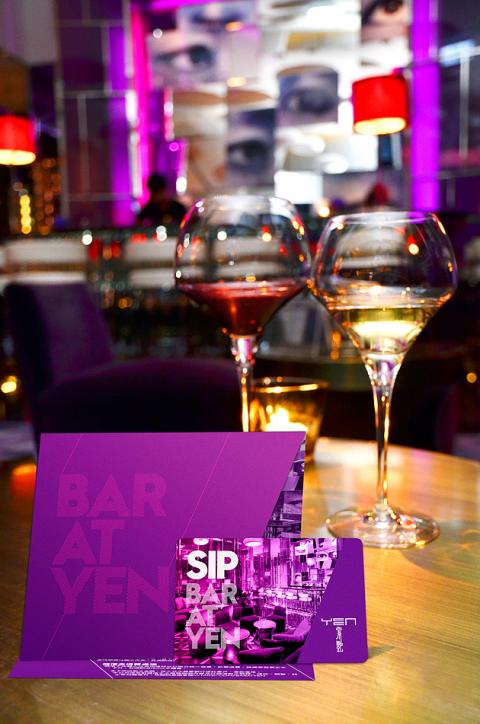W Taipei’s Yen Bar has introduced the Sip wine tasting card, which gives patrons an easy and affordable way to sample wines from leading vineyards. The Sip room, which has a view of Taipei 101, is home to Yen’s new Enomatic wine serving system, a machine that allows bottles of wine to be opened and protected from oxidation.
Guests use their pre-paid Sip card to dispense wine from the Enomatic, with amounts ranging from a 10ml taste to a full 150ml glass. The machine can hold up to 12 wines at a time. The selection will change each month. August’s list features libations from vineyards in France, Spain, Italy and Chile. Highlights include Domaine Chanson’s Beaune 1er Cru Clos des Mouches and Chateau La Lagune’s Moulin La Lagune from France and the Bordeaux-style Sassicaia, one of Italy’s most renowned wines.
Yen Bar is located on the top floor of W Taipei and features sweeping views of the city. In addition to the Enomatic machine’s offerings, the bar also serves more than 80 kinds of whisky, 90 cocktails and 100 kinds of wine, along with tapas inspired by Asian cuisine.

Photo Courtesy of W Taipei
The Sip tasting card is priced at NT$500 and up, and prices for each wine start at NT$70 for 10ml. Call (02) 7703-8887 or visit www.wtaipei.com/baratyen for more information.

That US assistance was a model for Taiwan’s spectacular development success was early recognized by policymakers and analysts. In a report to the US Congress for the fiscal year 1962, former President John F. Kennedy noted Taiwan’s “rapid economic growth,” was “producing a substantial net gain in living.” Kennedy had a stake in Taiwan’s achievements and the US’ official development assistance (ODA) in general: In September 1961, his entreaty to make the 1960s a “decade of development,” and an accompanying proposal for dedicated legislation to this end, had been formalized by congressional passage of the Foreign Assistance Act. Two

Despite the intense sunshine, we were hardly breaking a sweat as we cruised along the flat, dedicated bike lane, well protected from the heat by a canopy of trees. The electric assist on the bikes likely made a difference, too. Far removed from the bustle and noise of the Taichung traffic, we admired the serene rural scenery, making our way over rivers, alongside rice paddies and through pear orchards. Our route for the day covered two bike paths that connect in Fengyuan District (豐原) and are best done together. The Hou-Feng Bike Path (后豐鐵馬道) runs southward from Houli District (后里) while the

March 31 to April 6 On May 13, 1950, National Taiwan University Hospital otolaryngologist Su You-peng (蘇友鵬) was summoned to the director’s office. He thought someone had complained about him practicing the violin at night, but when he entered the room, he knew something was terribly wrong. He saw several burly men who appeared to be government secret agents, and three other resident doctors: internist Hsu Chiang (許強), dermatologist Hu Pao-chen (胡寶珍) and ophthalmologist Hu Hsin-lin (胡鑫麟). They were handcuffed, herded onto two jeeps and taken to the Secrecy Bureau (保密局) for questioning. Su was still in his doctor’s robes at

Mirror mirror on the wall, what’s the fairest Disney live-action remake of them all? Wait, mirror. Hold on a second. Maybe choosing from the likes of Alice in Wonderland (2010), Mulan (2020) and The Lion King (2019) isn’t such a good idea. Mirror, on second thought, what’s on Netflix? Even the most devoted fans would have to acknowledge that these have not been the most illustrious illustrations of Disney magic. At their best (Pete’s Dragon? Cinderella?) they breathe life into old classics that could use a little updating. At their worst, well, blue Will Smith. Given the rapacious rate of remakes in modern